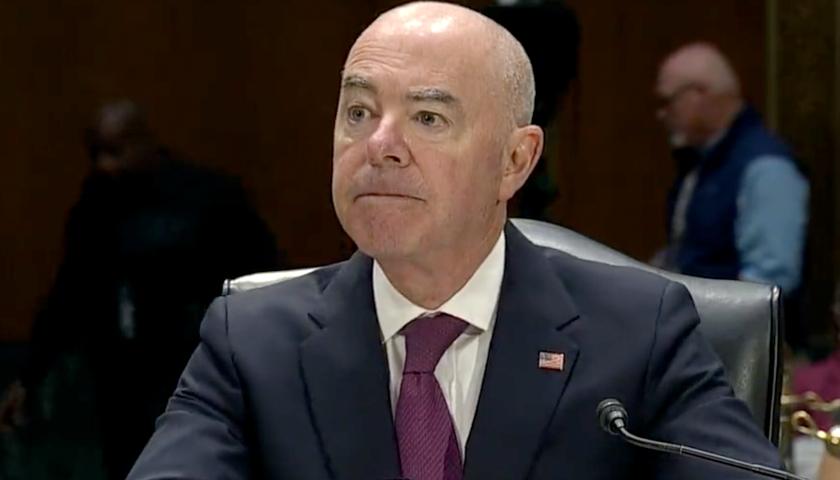by Jenny Beth Martin
A grave injustice may be about to take place in the Senate–and only public pressure can prevent it.
I write of the upcoming impeachment trial of Homeland Security Secretary Alejandro Mayorkas, who was impeached by the House on February 13 on two counts: that he failed to comply with the law and that he lied to Congress about the results of his failure to comply with the law.
 Next Wednesday, the Senate will receive the articles of impeachment from the House, according to a letter sent to Senate Majority Leader Charles Schumer by House Speaker Mike Johnson and the 11 members of the House chosen to serve as impeachment managers. The following day, the Senate will open its impeachment trial against Mayorkas. Each of the senators will be sworn in individually as a juror in the trial.
Next Wednesday, the Senate will receive the articles of impeachment from the House, according to a letter sent to Senate Majority Leader Charles Schumer by House Speaker Mike Johnson and the 11 members of the House chosen to serve as impeachment managers. The following day, the Senate will open its impeachment trial against Mayorkas. Each of the senators will be sworn in individually as a juror in the trial.
Yet if Schumer has his way, according to media accounts, that trial will be very short – in fact, it will be so short it will seem as if there were no trial at all, because as soon as the senators are sworn in as jurors, Schumer could simply hold a vote on a motion to dismiss the charges outright. Or perhaps he will hold a vote on a motion to move the consideration of the case to a smaller subcommittee, to report to the full Senate later.
Schumer likely will want to shield in-cycle vulnerable Democrat senators from having to cast a recorded vote before the election on an issue that could serve as a proxy for a vote on President Biden’s handling of illegal immigration. Certainly, Democratic Sens. Sherrod Brown (Ohio), Jon Tester (Mont.), Jacky Rosen (Nev.), Bob Casey, Jr. (Pa.), and Tammy Baldwin (Wisc.) would appreciate not being required to vote against convicting Mayorkas – because that could be interpreted by their constituents as voting to defend Biden’s handling of the situation at the border. And with the vast majority of the American public opposing Biden’s handling of the situation at the border, a vote to defend Mayorkas is a vote that no Democrat senator running for reelection this year wants to take.
The Constitution, however, says nothing about shielding senators from having to take tough votes by moving the consideration of articles of impeachment to a subcommittee of the Senate.
The articles of impeachment against Mayorkas are serious. They warrant serious consideration and a full and fair trial by the full Senate.
Mayorkas is not a federal district judge whose misdeeds, however bad, would be limited to affecting the citizens of one of 94 federal judicial districts. Mayorkas is a cabinet officer in charge of a vast federal bureaucracy, whose misdeeds have turned every state in the union into a border state.
Further, Mayorkas is the first sitting cabinet officer to be impeached. The only previous time the Congress took similar action against a cabinet officer was in 1876, when Secretary of War William Belknap resigned his position in an attempt to thwart the House’s intent to impeach him – but the House went ahead and impeached him anyway, and then, just for good measure, the Senate decided to put him on trial.
Think about that for a moment: The House and Senate were so determined to uphold the standards of the office that both followed through to impeach and then put on trial a cabinet officer who had already resigned. If Schumer, by contrast, moves to dismiss the articles against Mayorkas without even hearing the evidence, he will be sending the exact opposite message, that the current Senate doesn’t care at all about upholding the standards of the office.
Republican Sen. John Kennedy (La.) spoke eloquently on the Senate floor last month about the significance of the Mayorkas impeachment trial. “The Senate,” he said, “must let the House present its case, and then we must do our job and give that case careful consideration. If the Senate dismisses these charges without a trial, as if it’s just a parking ticket being fixed by some politician, it will be the first time – the very first time – in the Senate’s history that it has dismissed impeachment charges against an official it has jurisdiction over without that official first resigning. … Precedent demands a trial. … Respect for the House of Representatives demands a trial. … Respect for the law, Mr. President, demands a trial … and the American people demand a trial, and they deserve it. The United States Senate should do its job.”
Kennedy is right. The Senate should do its job. And if it does not – if Schumer holds a vote to dismiss the charges against Mayorkas without even holding the required trial – then the voting public should pay special attention to how their senators voted on that motion to dismiss the trial, because in a 51-49 Senate every single Democrat who casts a vote to defend Mayorkas by dismissing the charges against him will be casting the deciding vote.
– – –
Jenny Beth Martin is co-founder and national coordinator of the Tea Party Patriots, the nation’s largest tea party organization, and is also chairman of the Tea Party Patriots Citizens Fund.
The views and opinions expressed in this commentary are those of the author and do not reflect the official position of the Daily Caller News Foundation.
Photo “Alejandro Mayorkas” by CSPAN.





